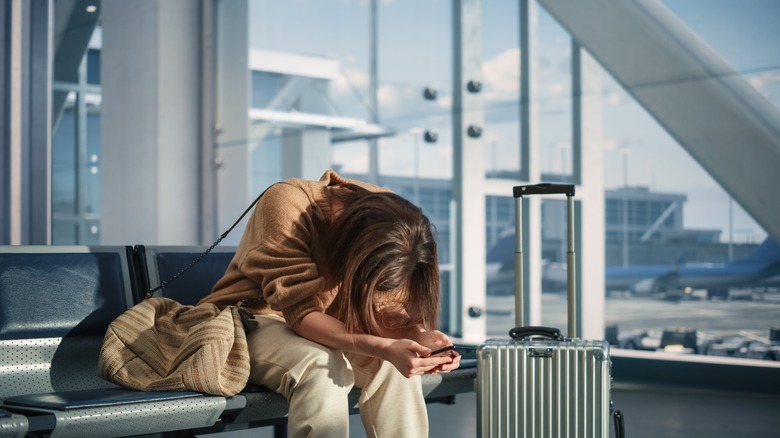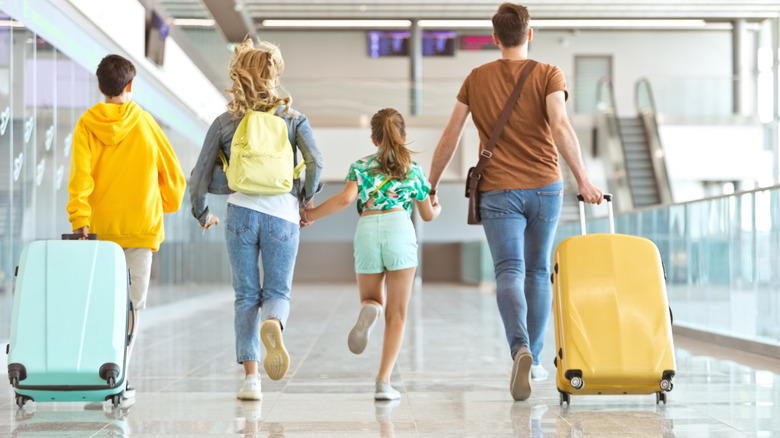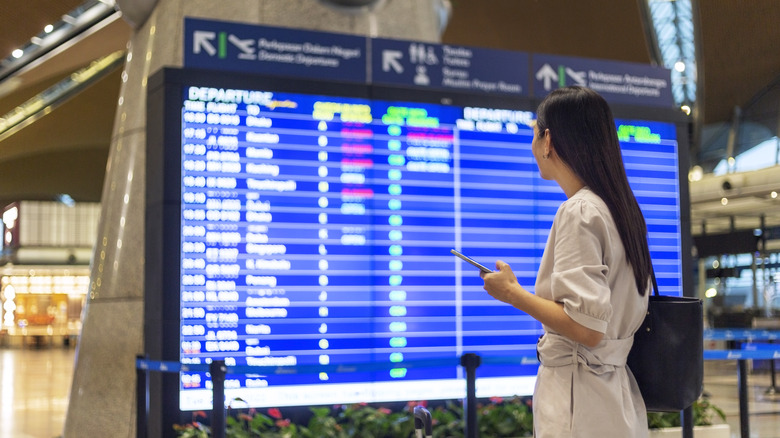Airlines Are Allowed To Give Away Your Plane Seat If This Happens
It's a situation that has become far too common these days: You arrive at the airport, go through security, and when you get to the boarding gate, the agents suddenly ask for volunteers to take a later flight. Sometimes, they don't even ask — they just bump you without prior notice, especially if they don't get enough volunteers. According to a study by The Wall Street Journal, denied boardings have doubled from the period of October 2020 through September 2021 to the same period the following year. The culprit? There are simply not enough flights to go around.
"There are fewer flights into lots of markets, and the airlines are less certain about demand," Paul Tumpowsky, founder and CEO of travel agency Skylark, explained to USA Today. "It shouldn't surprise people that that volatility leads to underselling and overselling lots of flights because they're less sure of what demand looks like in a lot of markets." Airlines are still struggling to gauge flight demands, a process that's made even more complex by the COVID-19 pandemic.
Unfortunately, passengers are usually at the mercy of airlines, and when they decide to bump you off a flight, you have no choice but to comply. They also have their own criteria for denying passengers a seat, including the amount you've paid for the flight, your frequent flyer status, and the time you've checked in. Yes, this means that if you're running late, you're more likely to be denied boarding.
Airlines can give your seat away when you're late
Airlines obviously give seats away when there are no-shows, but even if you're coming from a connecting flight and called ahead to say you're running late, there's still a chance you'll be bumped.
Delta spokesperson Drake Castañeda told The Washington Post that it's not a common occurrence, but it does happen. "The gate agent uses their discretion," he confirmed. Usually, they do a final rollcall of passengers who have not boarded yet, but if they don't show up at their cut-off (airlines typically have a 10- to 15-minute leeway before takeoff), they have all the right to give your seat away to standby passengers. Even if you do somehow make it to the gate and the flight isn't full, it may be too late. Castañeda noted that they typically do a "closing out the flight" process in the minutes leading to the scheduled departure, and once they start that, you can no longer board.
To mitigate incidents like this, American Airlines has reportedly launched a tool called AUtomated ReAccommodation, which automatically rebooks passengers who will not make it in time for their connecting flight. Per View from the Wing, if the tool identifies that there's very little chance that you'll get to board your next flight, it reassigns you to a different one. It may not come as a surprise if other airlines follow suit — if they haven't already.
So you got bumped — what now?
In the event that you do get involuntarily bumped, you should be aware that you have the rights to get compensation. Federal law requires airlines to compensate passengers for the trouble — usually through cash, airline credits, accommodations, and more. Normally, the rule is you may get up to 200% of your one-way airfare if your next flight brings you to your destination one to two hours later than your original arrival schedule. If your new arrival time is beyond two hours, you may get up to 400% of the one-way fare. If the situation is dire, a tweet from columnist Jason Aten suggests that airlines have offered as much as $10,000.
That's an anomaly, of course, but it does happen. In case you decide to volunteer, the smart thing to do is to negotiate. You're the one getting inconvenienced, after all. "Many times you can negotiate for things like a better flight, hotel vouchers, meal vouchers and lounge passes," Scott Keyes, the founder of Scott's Cheap Flights, shared with Time. "There's a secret menu of options that airlines have at their disposal that they can offer you beyond money or credits." Aside from the payout, you may also ask to get a better seat on the next flight. The airline may not relent, but it's worth trying. "Like so many companies, airlines are profit-seeking corporations," Keyes added. "They're not going to start out by offering $10,000. But when they're desperate enough, they will."


